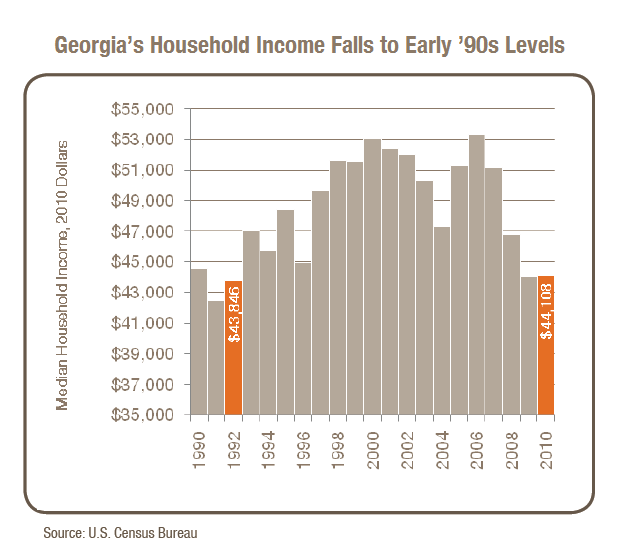Posted by Wesley Tharpe
The year was 1992. An exciting Braves squad was playing toward its second World Series; a young governor from Arkansas was campaigning for president; “Seinfeld” was becoming a Thursday night mainstay; and Boyz II Men was the #1 pop artist in the country. On the economic front, the nation was emerging from recession, but life for Georgia’s working families was actually pretty good. The state’s economy had been steadily expanding for more than three decades, and job growth was poised to explode in the next few years. Georgia’s median household income was $43,864 (in 2010 dollars), compared to slightly less than $40,000 in 1984.
Twenty years later, despite the world changing in countless ways, working Georgians remain largely stuck in the past economically, as our new edition of Jobs Counts highlights. The major culprit is the Great Recession, which wiped out about 20 years’ worth of wealth for typical American families, according to new data from the U.S. Federal Reserve. Median household wealth fell by 39 percent nationally between 2007 and 2010, returning average families to their 1992 wealth level. The Fed study was looking at Americans as a whole, but separate information suggests Georgia was not excluded from the trend. Georgia’s median household income in 2010 was only slightly higher than it was in 1992, once inflation is taken into account (as shown in the chart).
As Georgia gradually emerges from the Great Recession, it’s important to keep these lost 20 years for working families in mind. The last three months have been among Georgia’s strongest for job growth in the last five years. That’s great news. But occasional blips of positive shouldn’t distract us from how far working people have fallen in recent years – and how far they still have to go to get back.
Making life better for average working families will require investments in Georgia’s workforce through quality education and job training, a healthy safety net to catch those who fall behind, and strategic spending in areas like infrastructure, public safety and other ingredients of future growth. Until Georgia policymakers are willing to make those commitments, too many families will remain stuck in 1992.









